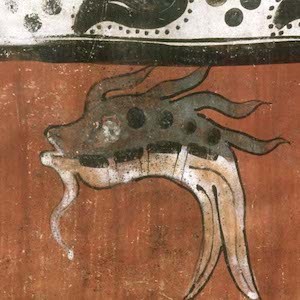Religion

A PreColumbian Portfolio: An Archive of Photographs
Each database record includes a caption, a brief (about 20-word) description, and information on the culture associated with the artifact, such as Maya, Olmec, or Zapotec.How to Teach Children: Childrearing and Confucian Doctrine
This excerpt comes from a chapter of Okina mondô, or Dialog with an Old Man, by Nakae Tôju (1606–1648), a Neo-Confucian philosopher. The Dialog teaches practical ethics through a series of questions and answers between a young disciple, Taijû, and a wise old master, Tenkun.

Maya Vase Database: An Archive of Rollout Photographs
The vases include scenes of palace life, mythology, warfare, and animals.Biography of Empress Deng
This biography details the childhood of Empress Deng of the Later Han dynasty. Here she is noted for her precocious intelligence, beauty, and filial piety. She was named empress to Emperor He in 102 CE.
Learning begins in the Womb: Fetal Instruction
Han dynasty intellectuals such as Liu Xiang (c. 77-6 BCE) advocated "fetal instruction" [taijiao] as a means to influence the moral development of the child at the earliest possible opportunity.
The Child as Microcosm
In this passage, fetal development is described in terms of Daoist cosmogony in which all things in the universe emerge from one source, the Dao (meaning "the Way").
Zalkind–Hourwitz, Vindication of the Jews (1789)
In 1789, 40,000 Jews lived in France, most of them in the eastern provinces of Alsace and Lorraine. In some respects, they were better treated than Calvinists under the laws of the monarchy; Jews could legally practice their religion, though their other activities were severely restricted.
Voltaire, Selections from the Philosophical Dictionary
Voltaire was the pen name of François–Marie Arouet (1694–1778), an Enlightenment writer known for his plays and histories and his acerbic criticism of the French Catholic Church. This set of selections is from his Philosophical Dictionary of 1764.
Voltaire, "On the Church of England"
Voltaire was the pen name of François–Marie Arouet (1694–1778), an Enlightenment writer known for his plays and histories and his acerbic criticism of the French Catholic Church.
Remonstrance by the Parlement against the Denial of Sacraments in Paris (1753)
As the controversy over the refusal of sacraments came to dominate political and religious discussions in Paris, Versailles, and across the kingdom, the magistrates argued all the more strenuously that the King should compel the Archbishop to drop his intolerant attitude on the enforcement of Uni